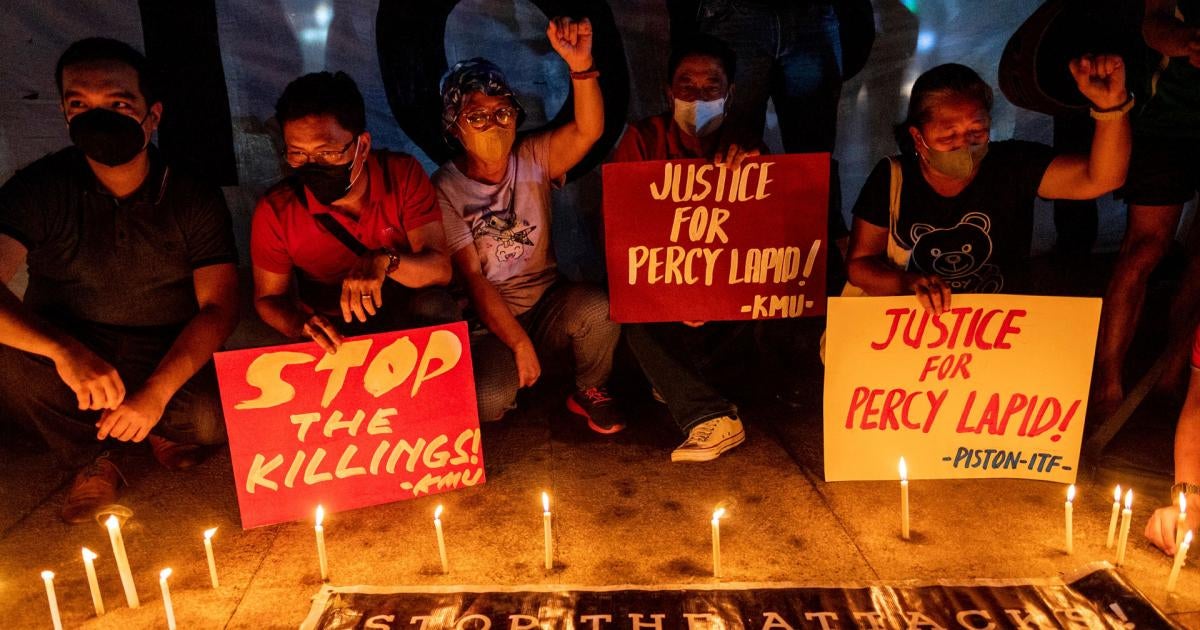Killing of Radio Journalist in Philippines Adds to Grim Toll

Unidentified gunmen on Monday evening fatally shot a hard-hitting radio commentator in Las Pinas, a city in Metro Manila, the latest in a long line of targeted killings of journalists in the Philippines. Percival Mabasa, popularly known on-air and online as Percy Lapid, was the second journalist killed since President Ferdinand Marcos Jr. took office on June 30. Police said the assailants were riding a motorcycle, the modus operandi for many targeted killings in the Philippines.
These so-called “riding in tandem” hitmen are rarely caught and brought to justice. Police said the gunmen shot Mabasa twice while he was inside his vehicle. Authorities have not identified any suspect nor disclosed a motive for the murder. Mabasa, who broadcast for station DWBL and regularly streamed his commentary on Facebook, rose to prominence for criticizing former President Rodrigo Duterte and his “"war on drugs", and Marcos, the son of the late dictator. Mabasa also tackled on air the practice of “red tagging” leftist activists and other critics of the government. In a Facebook post, Mabasa’s family said his “bold and sharp commentaries cut through the barrage of fake news.” Former Vice President Leni Robredo denounced Mabasa’s murder, calling it an attack on freedom and democracy.
The National Union of Journalists of the Philippines (NUJP) also condemned the killing, saying it shows that journalism remains a dangerous profession in the Philippines.
The NUJP said that 197 journalists have been killed in the Philippines since democracy was restored in 1986.
The killing of journalists typically occurs in areas far from Metro Manila, the National Capital Region. Victims are frequently radio broadcasters or commentators known for their critical commentary on local politics and corruption. On September 18, a man stabbed radio broadcaster Renato Blanco to death in Negros Oriental in the central Philippines. Filipino journalists not subject to armed attack are still often threatened in other ways. National and local officials have harassed journalists because they don’t like how they are doing their jobs.
They are increasingly aided by armies of social media trolls that threaten journalists, like Nobel Peace Prize laureate Maria Ressa, with violence. No wonder journalists in the Philippines never stop looking over their shoulders.
Read the full article at the original website
References:
- https://www.rappler.com/nation/broadcaster-percy-lapid-killed-in-las-pinas-2nd-under-marcos/
- https://www.hrw.org/news/2018/06/19/philippines-scourge-killers-motorbikes
- https://www.cnnphilippines.com/news/2022/10/4/Percy-Lapid-shooting.html?fbclid=IwAR2w5sjisT32vahA4l7VQqvPd_c_hQIKAPcZ5D7fOuYhgu2AokdPnYZmJIE
- https://www.hrw.org/tag/philippines-war-drugs
- https://www.hrw.org/news/2022/01/17/philippines-end-deadly-red-tagging-activists
- https://www.nytimes.com/2022/05/06/business/philippines-election-disinformation.html
- https://news.abs-cbn.com/news/10/29/21/ph-still-7th-most-dangerous-country-for-journalists
- https://cpj.org/reports/2005/08/phil-05/
- https://www.philstar.com/nation/2022/09/19/2210786/broadcaster-stabbed-dead-negros-oriental
- https://www.hrw.org/news/2018/12/06/new-weapon-against-press-freedom-philippines
- https://www.washingtonpost.com/world/2022/06/13/philippines-election-harassment-journalism-online/
- https://www.hrw.org/news/2019/02/13/politically-motivated-arrest-philippine-journalist
